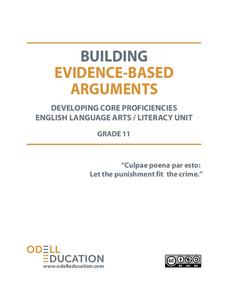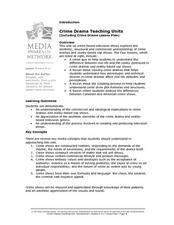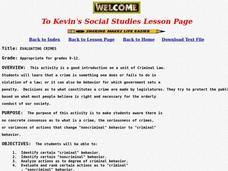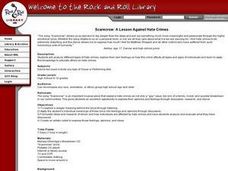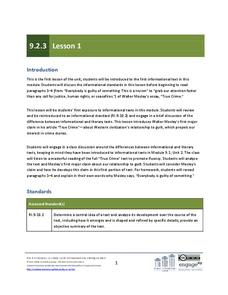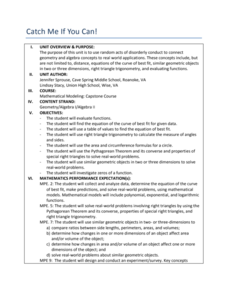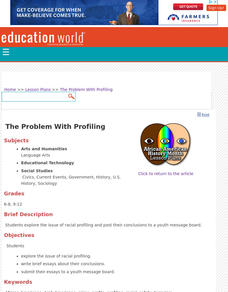Curated OER
Evaluating Crimes
What is crime? Discriminate between criminal and non-criminal behavior with your scholars by engaging them in potentially heated discussion about various scenarios. A brief definition of the word crime precedes individual analysis of 15...
Media Smarts
Scripting a Crime Drama
Develop novice script-writers. Small groups sift through a sample script, noting any script-writing conventions to share with the whole class. Using these conventions and plot structures, these groups compose a script for a 10-minute...
Odell Education
Building Evidence-Based Arguments: "Cuplae poena par esto: Let the punishment fit the crime."
Should a criminal's punishment match the crime? An argumentative writing plan explores this question as class members investigate a variety of mixed-medium sources by experts in the field, form evidence-based claims, and support them...
Media Smarts
Forensic Science Crimes Dramas
How do TV shows present criminology—is it realistic? High schoolers research crime dramas and participate in class discussion about topics such as who exists as the target audience and the values the shows communicate. They also research...
Curated OER
Crime Drama Teaching Units
Investigate the nature of crime dramas on television. What exactly are they trying to portray? Questions and a comparison chart support learners as they watch shows from Canada, Great Britain, and the United States. An oral presentation...
Curated OER
Evaluating Crimes
Young scholars studey that a crime is something one does or fails to do in violation of a law; or it can also be behavior for which government sets a penalty. penalty.
Curated OER
Committing Crime or Just Having Fun?
Students breakdown different types of youth crime/gangs. Students evaluate the power of peer pressure. Students identify and offer advice for dealing with peer pressure. Students encounter the theory of phenomena.
Curated OER
Theories of Crime and Punishment
Students examine goals of two major theories of punishment, Utilitarian Theory and Retributive Theory, develop opinions about ethics and effectiveness of both theories, define legal duties of prosecutors and public defenders, and discuss...
Personal Genetics Education Project
DNA, Crime and Law Enforcement
Civil rights meets biotechnology in a instructional activity that scrutinizes the collection of DNA of citizens who have been arrested, but not yet convicted of a crime. Real-life cases are examined in which the DNA of a relative was...
Curated OER
Science in the Court Room
Share their opinions on the use of DNA databases in criminal investigations. After reading an article, they evaluate the pros and cons of the databases and work in groups to answer discussion questions. They write a letter to a state...
Curated OER
Race and Crime in the United States: Are We Victims of Discrimination or Antiheroes?
Using methods adopted by Public Policy Analysts (PPA) class groups define a social problem, gather evidence to document the existence of the problem, identify causes, evaluate existing policies designed to deal with the problem, develop...
Curated OER
Scarecrow: A Lesson Against Hate Crimes
Students analyze and discuss different types of hate crimes. They listen to and discuss the background behind the song, "Scarecrow" by Melissa Etheridge. They research a hate crime and imagine how the victims must have felt. Finally they...
Curated OER
Safety
Students examine crimes common among older adults. They compare the similarities and differences between crimes affecting both the young and old. They take and review a 'crime quiz'. They discuss resources in the community that provide...
EngageNY
Grade 9 ELA Module 2, Unit 3, Lesson 1
"True-crime stories, murder mysteries, up-to-the-minute online news reports, and (as always) rumor and innuendo grab our attention faster than any call for justice, human rights, or ceasefires." Or so says Walter Mosley in his Newsweek...
Radford University
Catch Me If You Can!
Crime doesn't pay, but everyone can learn from it. Learners consider different situations involving mischief at a school, such as stink bombs and rockets, and analyze them using mathematics. They must apply trigonometry, quadratic...
Curated OER
Cameras and Crime: A community keeps a lookout
Using a variety of linked sites, students find out what has happened in Collinwood (surveillance cameras installed to help eliminate crime). Students discuss when surveillance cameras could be appropriate, and when they would not be....
Curated OER
True Crime
Students discuss reasons for the increase in violent crime across the country. They examine the factors to which increases in violent crime can be attributed. Students brainstorm consequences of the forces that have led to the decrease...
Echoes & Reflections
Studying The Holocaust
While many young scholars are familiar with the Holocaust, they may not understand the specific history that led to the unprecedented atrocity. The first lesson in the unit helps teachers gauge their pupils' background knowledge. A...
Curated OER
A Civil Action
Young scholars explore the roles of law enforcement officials, the news media, and civilians in crime prevention and criminal apprehension. They envision ways to build and strengthen community partnerships to address concerns about crime.
Curated OER
"Split" Character Studies in Crime and Punishment
Students write an essay evaluating split character traits on major characters in Dostoevsky's novel Crime and Punishment. In this lesson students are guided through discussion questions, group assignments, and vocabulary work. The lesson...
Curated OER
Who Took Jerell's iPod? ~ An Organic Compound Mystery
Within the setting of a crime scene investigation, biochemistry beginners analyze organic compounds as a means of determining "Who dunnit." They use a brown paper test for lipids, glucose test strips and iodine to identify carbohydrates,...
Curated OER
The Problem with Profiling
Students explore the issue of racial profiling and post their conclusions to a youth message board. They research the issue of racial profiling and post their thoughts to a message board.
EngageNY
Grade 9 ELA Module 2, Unit 3, Lesson 11
Who is to blame for Bernie Madoff's crime? Class members look for evidence Diana B. Henriques uses in The Wizard of Lies: Bernie Madoff and the Death of Trust to support her claims that we share the responsibility with Madoff.
EngageNY
Grade 9 ELA Module 2, Unit 3, Lesson 13
Using the open-ended discussion questions developed the day before, class members engage in a fishbowl discussion of the three texts that anchor the unit: “True Crime: The Roots of an American Obsession," “How Bernard Madoff Did It,” and...




